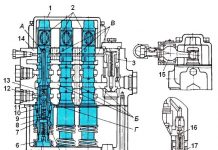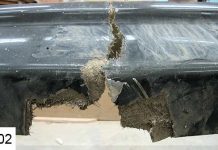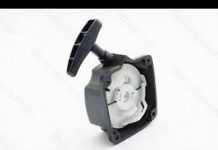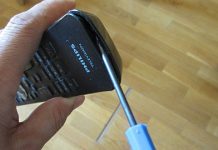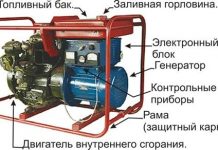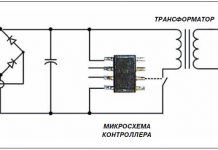In detail: do-it-yourself manual transmission repair Renault Scenic 1 from a real master for the site my.housecope.com.
Renault Scenic engines of the second generation are traditionally reliable, however, when servicing and repairing power units, it is recommended to contact specialized specialists or service stations. For example, carrying out work on replacing the timing belt with a run of 50-60 thousand km with your own hands can lead to the fact that the position of the gear of the working shafts will be violated. Tightening the fastening bolts to secure it after an approximate eye adjustment is inappropriate, as the quality of such work will be of poor quality. In parallel with replacing the timing belt, experts recommend replacing the water pump. To ensure high quality of this type of repair and replacement of spare parts and consumables, special equipment, tools and appropriate conditions are required.
It should be noted that the Renault Scenic II 1.6 model, like other cars of this French brand, such as the Megan model, is very demanding on original consumables.
The use of products from other manufacturers significantly affects the operation of many components and mechanisms of these vehicles. Overhaul of the suspension of this Renault model may be required after 100,000 km.
Special attention should be paid to preventive maintenance of all units of the model of the first sample. Factory sealing defects appear rather quickly, and their elimination can be done with your own hands, having the skills to repair a car.
Also, often repair work requires stabilizer bushings. When replacing them, you will need the help of a specialist, and it will be difficult to do this work with your own hands even for a motorist with a certain experience. The rear suspension of the car has a torsion bar structure, and only a specialized specialist can understand it. Another common drawback is the rapid wear and tear of the front wheel bearings. The nature of such faults can be explained by the peculiarity of the front suspension, and the replacement of these parts can be done with your own hands in a garage.
| Video (click to play). |
For example, an operation such as flushing the injectors is required much more frequently in the second generation model, in contrast to the 1998 model. This is due to the more demanding fuel system of the updated car. While the work on changing the engine oil is easier to carry out on the new model due to the convenient location of the drain neck and many other factors.
According to the reviews of the masters at the branded service stations, the most problems arise with the cars of 1998 release. This is due not only to their age and high average total mileage, but also to the design features. The second-generation car is assembled with a better quality and unforeseen breakdowns or premature failure of one or another unit, assembly or part are much less common. As an additional example, experts cite an analogy with the evolution of Megan cars. The first models had a lot of shortcomings, but they were eliminated in the designs of the subsequent ones.
Renault Scenic 1 gearbox (checkpoint) repair can be major or partial. Repair of the box (manual transmission) Renault Scenic 1 must be done only after initial diagnostics in a car service. Very often, a third-party opinion that the box needs to be repaired turns out to be erroneous. It can also be caused by the clutch, flywheel, and gear selector.
We offer two options for repairing a transmission (manual transmission):
Partial (local) repair of the Renault Scenic 1 checkpoint - we remove the box, disassemble it, wash and defect. Troubleshooting a box is determining the cause of its failure, indicating a specific malfunction. A list of spare parts for this malfunction is also provided. After agreement, we make repairs to eliminate the specific malfunction that the client has contacted. We do not touch the rest of the components and spare parts in the gearbox.
Overhaul of the Renault Scenic 1 checkpoint - as well as with partial repairs, the box is removed and completely disassembled, washed and defective. In this case, we are not looking for a specific cause of the breakdown, but we are doing a complete defect diagnosis. All units and spare parts with increased wear, all bearings, oil seals and gaskets are determined and changed.
My gearbox was making a terrible grinding noise at 1 and 2 speeds. After consulting with knowledgeable people, I came to the conclusion that I, at the very least, need to replace the shaft support in the gearbox.
The box must be removed completely. The job is not the easiest one, but you can't do without it. In the best case, it will take four hours.
View after removing the gearbox.
View after removing the gearbox from the underside of the wheel arch.
The troublesome process of removing the box has been successfully completed. Opening it, I was surprised to find that the box was not hermetically sealed with something special. I only unscrewed a few bolts and the box opened quite easily.
The red square is an indicator that my bearing has broken.
Main shaft. There are two parallel bearings that we have replaced.
While my old bearing was being repaired, I cleaned the magnet, which was covered with metal shavings from the broken bearing, as well as a few teeth that had broken off from the outer edge.
We install the bearings and the gearbox back. It took about four more hours.
This article will focus on another chronic sore of many Renault models: Scenic, Megane, Clio, etc. with manual transmission. Namely, gear shifting problems. This material will help fairly advanced owners who have experience in self-repairing their Renault.
Required spare parts for replacement on the example of the first generation Renault Scenic:
2. Cuffs plastic fixing (bushings) - 7700695569
3. Rubber clip (damper)
4. Reverse gear cable retainer (inside the sphere) 7711129445
5. Bellow outer 7700863684
Typical symptoms:
Complicated gear shifting, additional load for shifting. The most common problems with the inclusion of the first and second gear. Complications build up over time.
The symptomatology is influenced by the time, mileage, the presence of lubrication, as well as the unsuccessful execution of the mechanism by Renault engineers in itself.
The design developed by Renault engineers is, to put it mildly, unreliable. For the precise operation of gear shifting in the checkpoint, engineers have built a complex mechanism that requires complex precision in operation.
The following components are responsible for precise operation in the switching mechanism:
1. Rubber clip - damper
3. Fixing plastic cuffs (sleeves)
For the reasons described above (time, mileage, etc.), these mechanisms wear out rather quickly, which leads to problems with gear shifting on Meganes, Scenes and other Renault models from the Megane line.
The main problem is the plastic cuffs, which wear out first and provide vertical play.
In second place is a sphere, in third is a damper.
The Renault manual transmission backstage has other problems - the outer boot, the upper clip for the reverse gear, more on that later.
Diagnostics of the backstage problem
If your car has the symptoms described above, then first of all you need to check for the presence of vertical backlash on the gearshift knob. We also pay attention to the switching mechanism and the state of the hold-down spring.
The manufacturer Renault and representatives of the official Renault dealerships believe that in “our” case it is necessary to replace the ENTIRE mechanism, from the gearshift knob to the thrust link.
If there is a desire to save money, as well as in the presence of hands from the right place, we read the description of the repair procedure:
We disassemble the backstage mechanism. Depending on the model and modification of your Renault, the algorithm and procedures may differ, but the principle is the same throughout the line.
1. We throw off the checkpoint rod from the wings - 1 nut
2. Unscrew the mounting bolts of the gear selector housing - 4 nuts
* For some models, to complete steps 1 and 2, it is necessary to remove the exhaust pipe, cardan, disassemble the inner panel of the gearshift lever.
3. We remove the entire gearshift handle mechanism
4. One of the interesting points is the removal of the handle! Stock up on patience and a vocabulary from the obscene vocabulary.
* I advise you to find the holes on the inner sleeve of the handle and pre-widen them with any suitable metal rod. Next, we stupidly knock down the handle, but I will repeat everything through the inner sleeve.
5. Next, remove the retaining ring. We throw off the reverse gear cable and remove the locking stopper.
6. We take out the whole mechanism. It is important to remember the sequence.
7. We get to the rubber damper we need, in which “the root of evil is hidden”. Namely, it contains a sphere and two cuffs, inside the sphere there is another sleeve, they are different depending on the car model.
8. We take out the upper cuff from the rubber frame - the damper, then the sphere (it can be disassembled into two hemispheres), the lower cuff
... Important. Mark the top and bottom cuffs.
9. We remove the remnants of the old grease
10. We disassemble the sphere and put one of the halves upside down, you can all, or you can not change, the point is to find an option with the smallest vertical backlash.
11. Most importantly, we swap the upper and lower plastic cuffs. the main wear is on the lower lip.
* In more detail: We take the sphere clamped with inverted cuffs in our hands, if there is a gap, we try to turn the sphere or its halves, looking for the optimal position.
12. Putting everything together in the reverse order, as much as possible adding specials. grease. If you often repair a car, 7711126145 is suitable or any consistent thick for plastic. You can use polyflons, silicones, teflons, etc.
13. We collect everything and put it back
There is one more weak point in this mechanism - the outer anther, a thing not fatal, but still.So if you are doing repairs, prepare to replace the boot at the same time.
If you have something to add to the article, or you want to share your experience on this topic, please leave a comment.
If you are the author of a report on the repair, modification of a Renault car or recommend material for the Renault-Drive Knowledge Base - please, let us know
Renault Scenic 1 gearbox (checkpoint) repair can be major or partial. Repair of the box (manual transmission) Renault Scenic 1 must be done only after initial diagnostics in a car service. Very often, a third-party opinion that the box needs to be repaired turns out to be erroneous. It can also be caused by the clutch, flywheel, and gear selector.
We offer two options for repairing a transmission (manual transmission):
Partial (local) repair of the Renault Scenic 1 checkpoint - we remove the box, disassemble it, wash and defect. Troubleshooting a box is determining the cause of its failure, indicating a specific malfunction. A list of spare parts for this malfunction is also provided. After agreement, we make repairs to eliminate the specific malfunction that the client has contacted. We do not touch the rest of the components and spare parts in the gearbox.
Overhaul of the Renault Scenic 1 checkpoint - as well as with partial repairs, the box is removed and completely disassembled, washed and defective. In this case, we are not looking for a specific cause of the breakdown, but we are doing a complete defect diagnosis. All units and spare parts with increased wear, all bearings, oil seals and gaskets are determined and changed.
Description of the process of replacing and bleeding the clutch on a Renault car Scenic 1 and 2. Correct dismantling and installation of the clutch on the Renault Scenic model.
It is best to replace the clutch mechanism on a Renault Scenic 2 on a lift. The replacement process itself is not overly complex, however, it requires strict adherence to the sequence of work. At a certain stage, the participation of a second person will be required, therefore, it is necessary to agree on assistance in advance.
Prepare a clean container of appropriate size in advance to drain the gear oil from the shift box. gear... In this case, it is better to choose a container wide with low sides.
The preparatory work is over and you can proceed to the main and most critical stage of replacing the clutch.
To ensure comfortable work on replacing the assembly, remove the starter, having previously disconnected all sensors and wire connections. After removing the battery and the platform on which it is installed, direct access to the bolt connection of the gearbox support is opened. The bolts must be unscrewed, and in case of scale formation or oxidation due to high temperatures, the place should be treated with special chemicals.
At the next stage, the bulk of all operations will be carried out from the bottom of the car. Watch friends a good video plot of checking the oil level in the gearbox of the Renault Logan box, as well as refilling and changing the oil…. It is necessary to carefully remove the subframe and fix the steering rack tightly. This may require a large diameter steel wire or clamp.
Checkpoint already removed. The video was shot for clarity. Details here
REMOVAL - INSTALLATION Automatic transmission /// RENAULT SCENIC /// 2006 In this video we will look at the removal and installation procedures
The next stage involves draining the transmission oil into a previously prepared container, as well as unscrewing the CV joint nuts. Next, the drives are removed, the release bearing hoses and the gearbox fastening are disconnected. To ensure maximum durability of the automatic transmission gear Kia Sid automatic transmission oil change is performed regularly, as. Along the bottom of the case boxes the gear changes are cleared of accumulated dirt and all connecting bolts are loosened. An additional revision of all available parts will also come in handy, and if necessary, they can be replaced.
The checkpoint is ready for dismantling and at this stage experts advise using third-party help. With sharp movements, the gearbox must be removed from the installation site, and given its considerable weight, there is a risk of falling and damage. That is why the partner must hold the body of the box. After removing the gearbox, full access to the clutch unit of this Renault model opens. Removal and replacement it will not make much effort, and a new set is installed in its place in the same position. After that, all dismantled parts and assemblies are reassembled in strict sequence.
The connection of the union and the tube is provided by a special bracket, which at the first stages of this procedure must be raised until it clicks. It is necessary to remove the tube and fix it in the first position. In this case, access to the main bore of the nipple opens. At its end, it is necessary to attach a transparent plastic tube connecting the fitting with a syringe for air evacuation. With the help of a syringe, pump out the liquid until air stops coming out of the system. This will be evidenced by the absence of bubbles in the transparent plastic tube. The next step is to add new fluid to the system. To do this, pinch the tube with your fingers to prevent air from entering and fluid from the system, then remove the fluid with air bubbles from the syringe and fill it with a new one, after removing the plunger. When the syringe body is located above the fitting, new fluid flows by gravity into the system.
When completing the bleeding procedure for the clutch of this Renault model, install the hose on the fitting in its original position and lower the bracket to fix it. The rocker is the Renault Logan gear knob, thanks to which the choice of the car's speed is provided. In this case, it is necessary to monitor the state of this connection in order to avoid fluid leakage.
After all air has been removed from the clutch system, it is necessary to check the operation of the pedal.Its movement should be smooth, and the full cycle of pedal operation should not provide for any dips or jamming. The manifestation of noise when pressing the clutch pedal may indicate the presence of problems with system parts or their incorrect installation. Extraneous sounds can be the cause of a defect or problem in the release bearing, as well as a malfunction of the driven and driving discs.
Renault Scenic books and manuals for free
Repair and maintenance manual for Renault Scenic
- Renault Scenic repair in photos
- the components and assemblies of the car are described in detail
- do-it-yourself elimination of typical Renault Scenic malfunctions
- colored wiring diagrams
Renault Scenic user manual and service manual
- operation manual
- Renault Scenic service manual
- trouble-shooting
- interactive wiring diagram
Wiring diagram Renault Scenic
- pinout of electrical connectors Renault Scenic
- features of electrical equipment
- elimination of malfunctions of electrical equipment
- detailed electrical diagram
Catalog of parts and assembly units Renault Scenic
- table of interchangeability of Renault Scenic car parts
- intended for service station workers and car owners
- parts catalog
Repair manual for Renault Scenic engine
- complete Renault Scenic engine specifications
- design features and engine repair
- DIY Renault Scenic engine troubleshooting
- a detailed description of the processes of disassembly, troubleshooting and assembly of the engine with photographs
Renault Scenic gearbox repair manual
- full technical characteristics of the checkpoint
- design and repair features of the checkpoint
- elimination of faults in the gearbox and transmission of the Renault Scenic car
- a detailed description of the processes of disassembly, troubleshooting and assembly of the Renault Scenic gearbox with photographs
Renault Scenic Injector Error Codes
- description and diagram of the injector
- decoding of engine fault codes
- elimination of injector malfunctions
- pinout of injection and wiring
- tuning Renault Scenic with your own hands
- engine tuning, body tuning, suspension tuning
- multimedia tuning guide
Prices for the repair of the Renault Scenic / Renault Scenic gearbox (mechanical and automatic). Automatic transmission and manual transmission repair. Replacing the clutch.
AUTOKUZOV + provides high-quality repair of Renault Scenic gearbox. Each of our clients will be able to make sure that the maintenance and repair of Renault Scenic gearboxes is carried out by competent specialists using 100% high-quality consumables. In the course of work, our employees use only reliable, proven brands and materials. It is also important that the Renault Scenic gearbox repair ((mechanical and automatic)) is carried out without a hint of economy. The advantages of our service are rich experience and high qualifications of each of the masters. We repair automatic transmissions and manual transmissions Renault Scenic of any degree of complexity.
Free expert consultation: Discuss the problem, and maybe the cost of repairs will be less. We try to help each of our clients.
To get a discount call:
+7 (495) 774-83-22 and +7 (966) 317-66-17
This manual is a factory manual for the repair of manual transmissions up to December 1996 release. JB and JC gearboxes were used on the following models: Renault 5, 9, 11, 19, 21, Express, Clio, Twingo, Laguna, Megane.
The manual is aimed at workers of service stations and garages, car owners. Illustrations and recommendations will allow even a novice car enthusiast to carry out repairs with his own hands. If you are not confident in your abilities, seek technical assistance from a specialist.
Content:
MANUAL TRANSMISSION
Assembly view with cutout
Identification
Transmission Cross Section and Tightening Torques (Nm)
Tightening torques
Gear ratios
Filling tanks - Applicable oils
Peculiarities
Modifications
Consumables
Parts that must be replaced with each removal
Special devices
Gearbox repair
Transmission shafts
Differential
Gear shifting mechanism
Lubrication chute
Reverse gear axle
Reverse brake
Speedometer
Clutch Release Bearing Guide
Crankcase connection
List of parts shown in the pictures
Transmission parts
Description of the process of replacing and bleeding the clutch on a Renault car Scenic 1 and 2. Correct dismantling and installation of the clutch on the Renault Scenic model.
It is best to replace the clutch mechanism on a Renault Scenic 2 on a lift. The replacement process itself is not overly complex, however, it requires strict adherence to the sequence of work. At a certain stage, the participation of a second person will be required, therefore, it is necessary to agree on assistance in advance.
Prepare a clean container of appropriate size in advance to drain the gear oil from the shift box. gear... In this case, it is better to choose a container wide with low sides.
The preparatory work is over and you can proceed to the main and most critical stage of replacing the clutch.
To ensure comfortable work on replacing the assembly, remove the starter, having previously disconnected all sensors and wire connections. After removing the battery and the platform on which it is installed, direct access to the bolt connection of the gearbox support is opened. The bolts must be unscrewed, and in case of scale formation or oxidation due to high temperatures, the place should be treated with special chemicals.
At the next stage, the bulk of all operations will be carried out from the bottom of the car. Watch friends a good video plot of checking the oil level in the gearbox of the Renault Logan box, as well as refilling and changing the oil…. It is necessary to carefully remove the subframe and fix the steering rack tightly. This may require a large diameter steel wire or clamp.
Checkpoint already removed. The video was shot for clarity. Details here
REMOVAL - INSTALLATION Automatic transmission /// RENAULT SCENIC /// 2006 In this video we will look at the removal and installation procedures
The next stage involves draining the transmission oil into a previously prepared container, as well as unscrewing the CV joint nuts. Next, the drives are removed, the release bearing hoses and the gearbox fastening are disconnected. To ensure maximum durability of the automatic transmission gear Kia Sid automatic transmission oil change is performed regularly, as. Along the bottom of the case boxes the gear changes are cleared of accumulated dirt and all connecting bolts are loosened. An additional revision of all available parts will also come in handy, and if necessary, they can be replaced.
The checkpoint is ready for dismantling and at this stage experts advise using third-party help. With sharp movements, the gearbox must be removed from the installation site, and given its considerable weight, there is a risk of falling and damage. That is why the partner must hold the body of the box. After removing the gearbox, full access to the clutch unit of this Renault model opens. Removal and replacement it will not make much effort, and a new set is installed in its place in the same position. After that, all dismantled parts and assemblies are reassembled in strict sequence.
The connection of the union and the tube is provided by a special bracket, which at the first stages of this procedure must be raised until it clicks. It is necessary to remove the tube and fix it in the first position. In this case, access to the main bore of the nipple opens. At its end, it is necessary to attach a transparent plastic tube connecting the fitting with a syringe for air evacuation. With the help of a syringe, pump out the liquid until air stops coming out of the system. This will be evidenced by the absence of bubbles in the transparent plastic tube. The next step is to add new fluid to the system. To do this, pinch the tube with your fingers to prevent air from entering and fluid from the system, then remove the fluid with air bubbles from the syringe and fill it with a new one, after removing the plunger. When the syringe body is located above the fitting, new fluid flows by gravity into the system.
When completing the bleeding procedure for the clutch of this Renault model, install the hose on the fitting in its original position and lower the bracket to fix it. The rocker is the Renault Logan gear knob, thanks to which the choice of the car's speed is provided. In this case, it is necessary to monitor the state of this connection in order to avoid fluid leakage.
After all air has been removed from the clutch system, it is necessary to check the operation of the pedal. Its movement should be smooth, and the full cycle of pedal operation should not provide for any dips or jamming. The manifestation of noise when pressing the clutch pedal may indicate the presence of problems with system parts or their incorrect installation. Extraneous sounds can be the cause of a defect or problem in the release bearing, as well as a malfunction of the driven and driving discs.
Renault Scenic books and manuals for free
Repair and maintenance manual for Renault Scenic
- Renault Scenic repair in photos
- the components and assemblies of the car are described in detail
- do-it-yourself elimination of typical Renault Scenic malfunctions
- colored wiring diagrams
Renault Scenic user manual and service manual
- operation manual
- Renault Scenic service manual
- trouble-shooting
- interactive wiring diagram
Wiring diagram Renault Scenic
- pinout of electrical connectors Renault Scenic
- features of electrical equipment
- elimination of malfunctions of electrical equipment
- detailed electrical diagram
Catalog of parts and assembly units Renault Scenic
- table of interchangeability of Renault Scenic car parts
- intended for service station workers and car owners
- parts catalog
Repair manual for Renault Scenic engine
- complete Renault Scenic engine specifications
- design features and engine repair
- DIY Renault Scenic engine troubleshooting
- a detailed description of the processes of disassembly, troubleshooting and assembly of the engine with photographs
Renault Scenic gearbox repair manual
- full technical characteristics of the checkpoint
- design and repair features of the checkpoint
- elimination of faults in the gearbox and transmission of the Renault Scenic car
- a detailed description of the processes of disassembly, troubleshooting and assembly of the Renault Scenic gearbox with photographs
Renault Scenic Injector Error Codes
- description and diagram of the injector
- decoding of engine fault codes
- elimination of injector malfunctions
- pinout of injection and wiring
- tuning Renault Scenic with your own hands
- engine tuning, body tuning, suspension tuning
- multimedia tuning guide
Description of the main technical characteristics of manual and automatic transmissions on the Renault Scenic car. Today I ran into a problem on Renault premium dCi car does not develop revs above 1400 as if. How to remove a headlight on a Peugeot 408 video Avto Lavka 24 Causes of malfunction and rules for repairing automatic transmission and manual transmission.
Mechanics. How to remove the hub on a Ford. How to remove a torpedo on a BMW X5 E53 photo German cars Reliable and maintainable.
When buying a new car, the question arises before the owner, which transmission to choose? Often the choice lies only in ease of use and dynamic characteristics, but it is worth paying attention to the subsequent maintenance of the unit.
To Renault Scenic served for a long time, you need to undergo maintenance on time and handle the manual transmission with care: no abrupt starts with slipping and switching in the red zone of the tachometer.
Automatic transmission. Problems with the stove fan on the Skoda Octavia, how to remove the motor. How to remove the leather seat upholstery on a foreign car. How to remove front bumper on Skoda Octavia A5 FL Ease of driving, difficulty in repair.
The Renault concern uses automatic machines from Jatco, the world's second-largest sales company, on its cars. How to remove a torpedo on an e53? BMW Club They are also used on Nissan and are quite reliable, but they have a number of disadvantages.
The biggest problem is the jolt when shifting from 1st to 2nd gear. Dealing with this problem is not easy, as there are many reasons for this behavior:
Checkpoint already removed... The video was shot for clarity. Details here
REMOVAL-INSTALLATION of automatic transmission /// RENAULT SCENIC /// 2006 In this video we will consider the procedures for removal and installation
- Throttle position sensor (TPS) malfunction.
- Incorrect automatic transmission oil level.
- Is there a rollback when parked on the mountain.
- Jerks when moving the selector to different modes.
- The box went into emergency mode.
- There are transmission errors in computer diagnostics.
Based on this data, it is possible to identify the cause of the breakdown and solve it by replacing the DPDZ, or the automatic transmission brake band.
The second problem lies in the electronic stuffing. The automatic transmission control unit is located under a plastic cover in the area of the wiper blade drive, often the reason for its failure is moisture, having penetrated into the unit case, it destroys microcircuits, tracks and capacitors. where is the washer reservoir and how to get to it on Renault Megan 99g. In this case, the electronic unit does not communicate partially or completely, often the car refuses to drive. How to check the solenoid valve of the phase regulator in Renault Megane 2? Please tell me how you can check the suitability of the solenoid valve of the phase regulator with an accuracy of 100%? Only repair will help here, if it is possible, otherwise, only replacement with a new one, which can hit your pocket hard.How to remove the front bumper on Skoda Octavia A5 FL - Removal of the unit is not required for this procedure.
And third, the wear of the packs of friction discs. As in mechanics, in an automatic transmission, the torque is transmitted through the friction of the disc, but there are many such discs in the automatic transmission and they work not dry, but in oil. How to remove a headlight on a Peugeot 408 video Auto Commission Service Untimely oil change leads to wear of friction pairs. How to remove a CV joint or drive assembly on a Skoda Fabia 1 - The product of friction, shavings, clogs the oil channels and this leads to improper operation of the entire mechanism. Tell me how to increase the front clearance on Renault Megan 2 by at least 5 cm, since our roads are not cleaned at all in winter, I constantly cling to the snow. How to remove the Starter on the Corolla 120? Electrical equipment The next step is to remove the mudguard, for which it is necessary to unscrew the screw that secures this accessory to the Renault Sandero sill, 2 screws to attach it to the wing and use a screwdriver to unscrew the retainer that holds the mudguard on the cross member of the car body. How to identify a faulty ignition coil on Renault Megane 2 - Duration: 5:13 Useful China 160 775 views Where is the capacity of the Renault Logan washer reservoir, how to remove the reservoir At an early stage of the malfunction, you can do with changing the oil in the box, in a neglected case, removing the unit and its complete overhaul.
Choosing Scenic, you need to know the pros and cons of the maintainability of the manual transmission and automatic transmission. A manual transmission is considered more reliable than a machine and its repair is easier, the box is disassembled down to the smallest detail and components are easy to find on store shelves. Since the manual (instructions) for operation does not contain this information about the name of all fluids poured into Renault Kaptur, so I decided to collect information that is available on the Internet and in various forums. How to make the dimensions work through the ignition switch on Renault Logan? The instrument panel does not light up (speedometer and tachometer), Renault Logan The reliability lies in the fact that there are not many reasons that will lead to a breakdown. How to remove a headlight on a Peugeot 408 video. The essence of the repair is to replace certain parts, for example, a synchronizer ring, bearing or gear.
In terms of maintainability, the manual transmission outperforms the machine; in many cases, the transmission does not need to be removed for subsequent repairs.
| Video (click to play). |
As for the driving characteristics, the automatic transmission is more suitable for driving in a big metropolis, without forcing the driver to be distracted by switching the selector in dense city traffic. The mechanics behave well on the track, excellent dynamics when overtaking, combined with low fuel consumption.How to remove the clutch master cylinder on Fiat Doblo video Fiat How to remove door trim on Mercedes Benz W124 VD-Profi Also, if there is light off-road on the way, then with the help of a mechanical box you can overcome the obstacle by the "swing" method, which is contraindicated for cars with automatic transmission.





